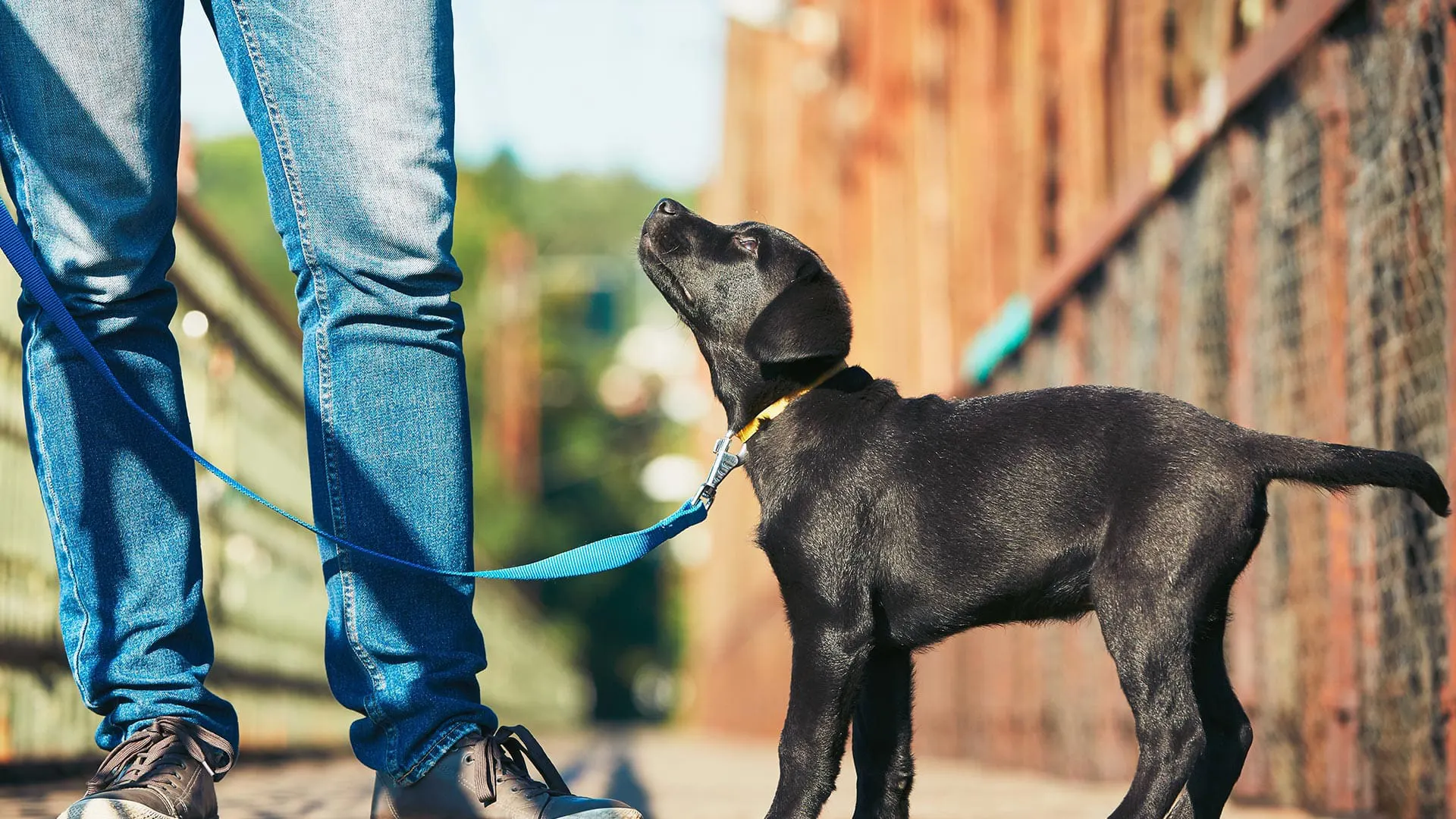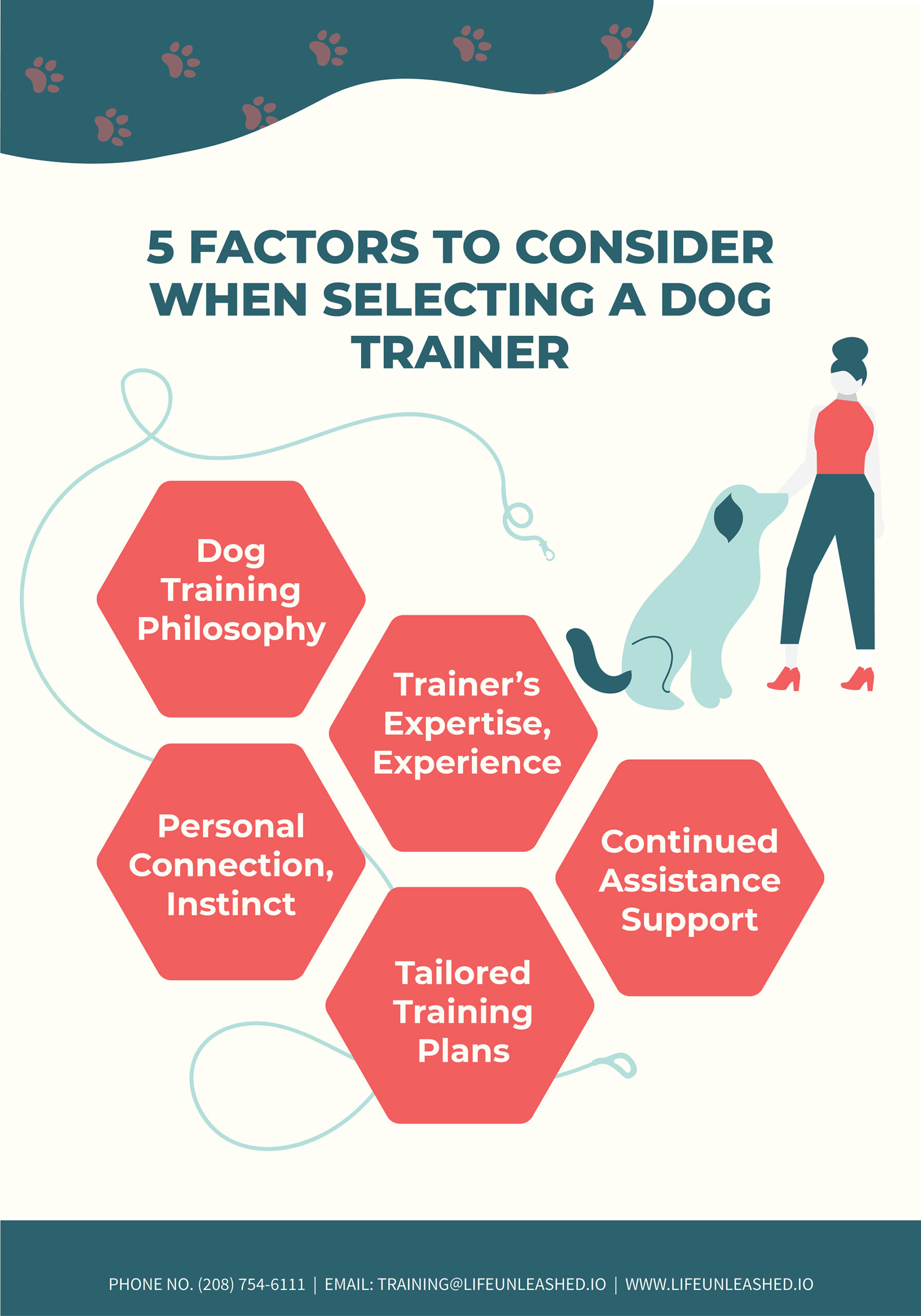Finding the right dog trainer can feel like searching for one good treat in a mixed bag—you never know what you’re going to get.
Unlike trusted treat brands that deliver quality every time, the world of dog training is unregulated. That means anyone can call themselves a trainer—no experience required.
But here’s the scary part: picking the wrong trainer isn’t just a waste of time and money. It can harm your dog’s behavior and even put their future at risk.
The good news? You don’t have to guess. As expert John Rogerson says, “A well-trained dog mirrors a dedicated owner.” By learning what truly makes a great dog trainer, you can confidently find a professional who brings out the very best in your pup.
Ready to find the perfect match? Let’s dig into what to look for, what to ask, and how to choose a trainer you—and your dog—will love.
What Factors Should I Consider When Picking A Dog Trainer
1. Dog Training Philosophy
When you’re on the hunt for a dog trainer, the most crucial aspect to consider is how they’ll approach teaching your furry companion. What’s their teaching style? Are they all about positive reinforcement, or do they lean towards balanced training?
Suzanne Clothier reminds us that, “Training is not about making a dog do something; it’s about making them want to do it.”
There are various dog training philosophies, each with its own approach and principles. Here is a list of some commonly known dog training philosophies: There are
- Positive Reinforcement Training
- Balanced Training
- Dominance-Based Training
- Mirror Training
- Science-Based Training
- Clicker Training
- Positive Punishment
- Classical Conditioning
As it turns out, both science and experience have shown that “positive reinforcement” or “reward-based” training is the way to go. It’s not only highly effective but also the most humane approach. You dish out treats (the extra yummy kind) to celebrate good behavior and keep them in your pocket when your pup isn’t at their best. Voila, you’ve got the happiest and most eager learner on your hands!
What’s cool about positive trainers is that they steer clear of anything negative. No harm, no foul. Because, let’s be real, those tough techniques can make your dog feel like throwing in the towel, leading to issues like fear and aggression. And nobody wants that drama.
2. Dog Trainer’s Expertise and Experience
As we have seen, exploring the world of dog training is a bit like finding your way in the Wild West – lots of paths and not too many rules. Just saying “you love dogs” or having a decade of furry friend experience doesn’t quite cut it in this open field. Experience is cool and all, but when it comes to dog training and behavior tweaks, we’re talking science. Understanding how dogs learn, using kind methods for behavior changes, and becoming a bit of a dog whisperer takes some serious learning. That’s why checking out certified dog trainers is a smart move.
Now, certifications are like a gold star on a paper, but they’re not everything. Fancy letters after a trainer’s name don’t guarantee they’re sticking to the certifying club’s rules or that they’re automatically the dog whisperer you’ve been dreaming of.
Since dog training is mostly about coaching humans, your chosen pro should be just as good at talking to you as they are at chatting up your dog. It’s a two-way communication street for a tail-wagging success story! 🐾✨
3. Tailored Dog Training Plans
“Dogs aren’t robots; they’re individuals,” points out Karen Pryor, a behavioral biologist. Think about it – dogs come from different backgrounds. Some may have been to school before, while others are just starting. A one-size-fits-all training wouldn’t work. Training should be like a personalized adventure for them.
A customized training plan that understands these differences, can focus on what makes your dog special, tackle specific behaviors, and go at your pup’s pace. It’s like having a tailor-made shoe that fits just right! This way, training becomes more effective, comfortable and a caring experience for your dog.
And hey, different dog breeds have their own quirks. So, a customized plan thinks about what makes your pup’s breed special and adjusts training to match their natural instincts.
4. Continued Expert assistance and support
To keep the training success rolling, ongoing support from the dog trainer is super important. A good trainer should know that learning extends beyond the actual training sessions. They need to lend a friendly hand to reinforce what your dog has learned, tackle any new challenges, and adjust training as your pup grows or faces different situations.
Plus, life changes happen – new places, new faces, and new adventures. Continued support from your trainer helps both you and your dog navigate through these changes, making sure the training stays effective in all kinds of real-life situations.
5. Personal Connection and instincts
Dogs are like little energy detectors—they sense vibes and feelings. And guess what? As a dog owner, your gut feeling is a superpower when checking out a trainer. If you and the trainer click, it creates this awesome learning vibe for you, your dog, and the trainer.
Just picture it: you’re all relaxed and comfy. That’s the magic recipe for your dog to totally ace the training sessions. Trust me, a happy owner equals a happy pup!
And when your instincts tell you the trainer genuinely cares about your dog and is ready to tweak their training style just for you, it’s like hitting the jackpot. So, follow those instincts, trust them! They’re your secret weapon to make a choice that feels just right for you and your furry companion.
What Are The Essential Questions I Should Pose When Meeting Potential Dog Trainer
Now that you’ve got the inside scoop on what makes a great dog trainer, here’s the info on some must-know answers that’ll help you narrow down the cream of the crop from your shortlist of dog trainers. Before you settle on the perfect dog trainer, just have a good ol’ chat with them. We’ve got a handy list of questions you can hit them up with before you jump into any commitments:
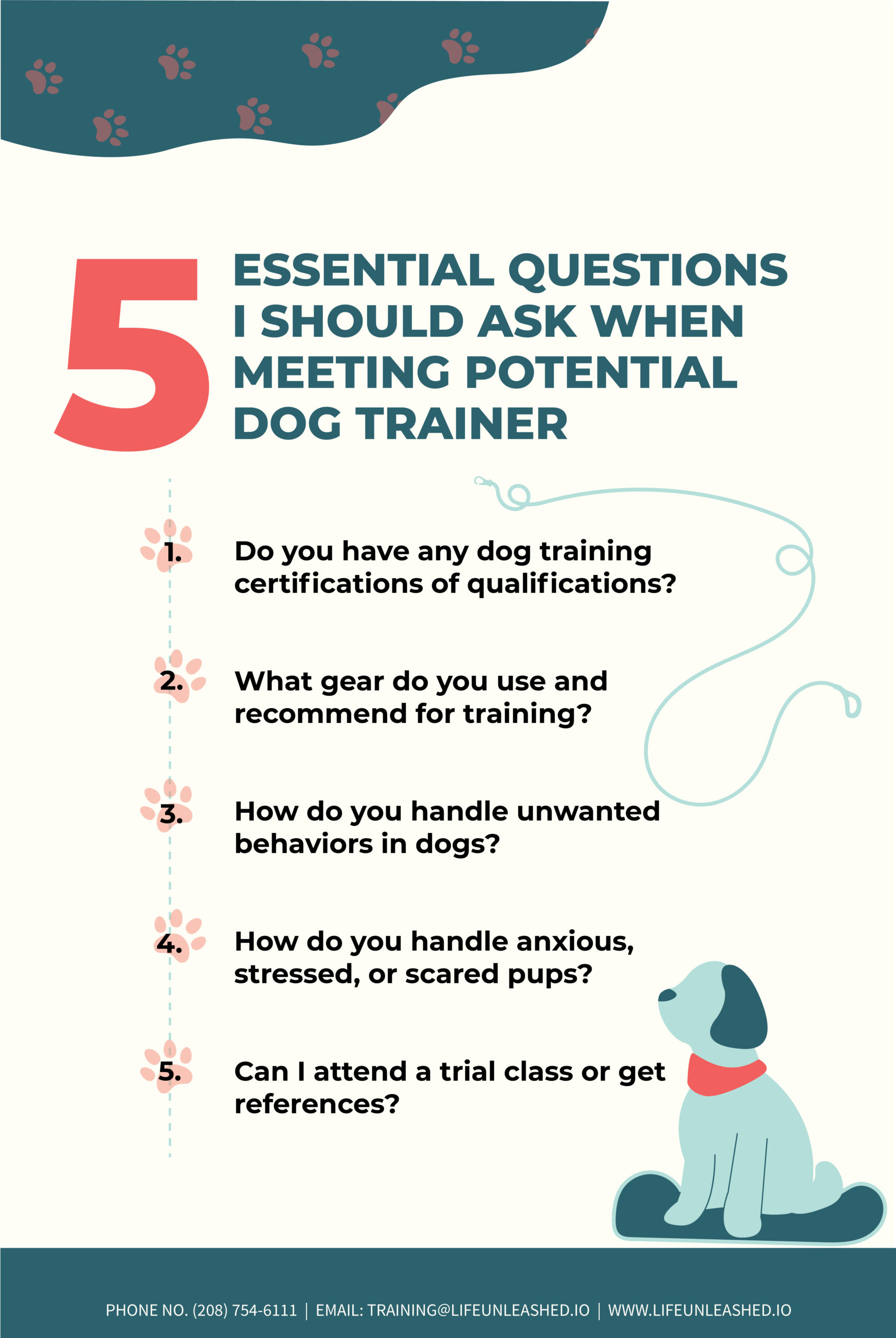
These questions will help you figure out if the dog trainer uses positive reinforcement, understands dog body language, and has real-life success stories. If any of their answers make you uneasy or they suggest things that feel off, trust your instincts and maybe look elsewhere. Just because they’re the “pros” doesn’t mean they’re the best fit for your furry friend. Watch out for red flags too; they’re like little signals telling you when to steer clear. 🚩🐾
Red Flags to Beware of When Evaluating Dog Trainers
Ok, frankly speaking, no dog trainer is going to come out and say their dog training techniques are old-school or potentially harmful, right? But being savvy about spotting red flags is key to making informed choices. Here are some signs that might scream, “Hold up, this trainer might be stuck in the past”:
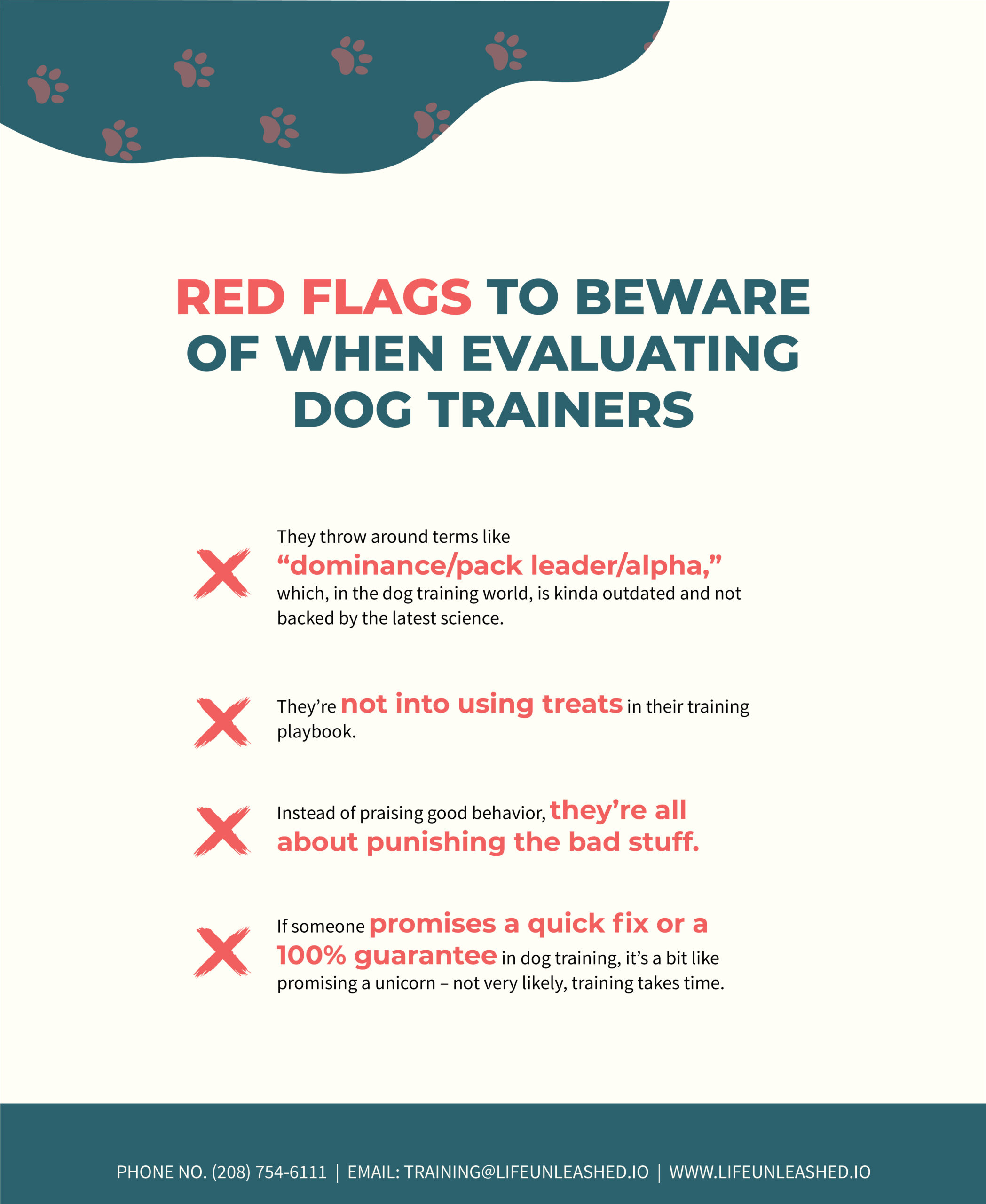
- They throw around terms like “dominance/pack leader/alpha,” which, in the dog training world, is kinda outdated and not backed by the latest science.
- They’re not into using treats in their training playbook.
- Instead of praising good behavior, they’re all about punishing the bad stuff.
- If someone promises a quick fix or a 100% guarantee in dog training, it’s a bit like promising a unicorn – not very likely, training takes time.
When you’re on the lookout for a dog trainer, these flags can be your guide. Do some digging, get the scoop from references, ask all the questions, and find a trainer who makes the whole process fun, safe, and positive for both you and your pup. Spotting these warning signs ensures your dog gets the training they deserve.
What Are the Best Ways to Find Great Dog Trainers Near You
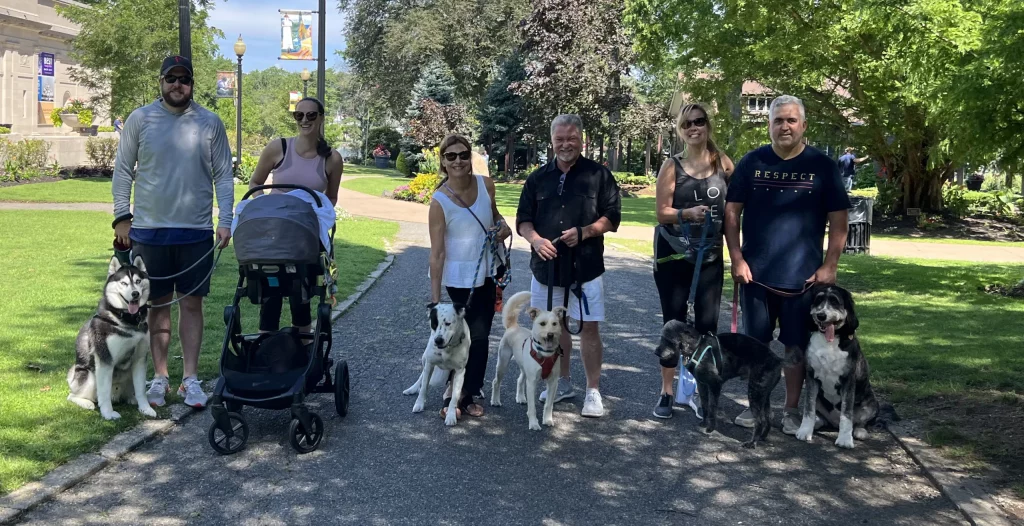
1. Local Veterinarians and Pet Stores:
Start your doggy adventure by chatting with your local vets and hitting up pet stores. These places are like the doggy grapevine and can hook you up with awesome trainers. Vets, especially, know the inside scoop on trainers who ace specific behaviors or vibe well with certain breeds.
2. Unleashed Featured Dog Trainers Hub:
Dive into the internet – it’s a goldmine! Explore cool platforms like Unleashed, where you can find specialized dog training wizards. Read real stories from other dog owners and get the lowdown on trainers in your hood. Don’t forget to check out Yelp and their social media for more insights.
3. Local Dog Clubs and Meetups:
Get social with local dog clubs and meetups. These gatherings are a hot spot for devoted dog parents who love to spill the beans on great trainers. Dog enthusiasts are always up for a chat about trainers who’ve worked wonders for their furry buddies.
Some pawsome dog clubs and meetups include:
- Boston Corgi Meetup Group
- The Houston Active Dogs Meetup Group
- Houston Dachshund Meetups
- Atlanta Kennel Club
- Idaho Capital City Kennel Club
4. Professional Organizations:
Check out the cool kids in the dog training world – the ones in professional organizations like IACP and APDT. These groups mean business when it comes to high standards. You can even use the Association of Professional Dog Trainers’ nifty tool to find a top-notch trainer near you.
5. Certifications and Credentials:
Look for trainers rocking certifications from places like CCPDT. These badges show they’re committed to being doggy geniuses. The Certification Council for Professional Dog Trainers has your back with a directory to find certified trainers near you. Certified trainers know their stuff about dog behavior and nailing those effective training methods.
6. Local Community Boards and Forums:
Be a detective in your local community – check out bulletin boards online and offline. Social media groups in your neighborhood might spill the tea on great dog services. This down-to-earth approach can uncover authentic suggestions straight from the community.
7. Word of Mouth:
Never underestimate the power of a good old chat. Ask your pals, family, neighbors, or coworkers who have dogs. Personal recommendations come with the real scoop on a trainer’s style, personality, and overall magic with dogs.
Conclusion
So, there you have it – a quick guide to help you pick the best dog trainer near you.
The journey to find the right trainer, requires some research and effort to discover the perfect fit for your dog. Seek references, ask all the necessary questions, and locate someone both you and your dog can rely on. Remember, the training process should be a delightful, educational, safe, and positive experience for everyone involved.
As the saying goes, “train the owner, and the dog will follow.” Being well-informed about what’s best for your dog is crucial because you’ll always be the voice for your furry companion. Your role is vital in your dog’s training journey.
FAQs about Picking Dog Trainers
How do I know if a dog trainer is a good fit for my dog's needs?
Find out if the dog trainer has a personal interest in your dog. Look for trainers who are interested in knowing your dogs history and personal life.
Are there red flags I should watch out for when selecting a dog trainer?
Yes, avoid trainers who prefer to dominate dogs while training them. Avoid trainers who punish bad dog behaviors and claim to have a quick 100% fix for your dogs challenges. It takes a life time to have a perfect dog. Training a dog is an ongoing thing and there can never be a one time solution to training a dog.
How can I find reputable dog trainers near me?
Explore various reliable sources, from local veterinarians to online platforms such as lifeunleashed.io link here, for discovering top-notch dog trainers in your area.
What questions should I ask during the initial meeting with a dog trainer?
- Does the dog trainer have any dog training certifications or qualifications?
- What gear does the dog trainer use and recommend for training?
- How do they handle unwanted behaviors in dogs?
- How do they handle anxious, stressed, or scared pups?
- Can I attend a trial class or get references?
How important is ongoing support from a dog trainer?
Dog training is more than just the basics like “sit, lie, stay.” Your trainer should paint a clear picture of what a happy and fulfilled life looks like for your dog, considering your lifestyle and routines.
What role does my intuition play in choosing a dog trainer?
Dogs are like little energy detectors—they sense vibes and feelings. And guess what? As a dog owner, your gut feeling is a superpower when checking out a trainer. If you and the trainer click, it creates this awesome learning vibe for you, your dog, and the trainer.
Is it necessary for a dog trainer to have qualifications and certifications?
While qualifications and certifications are not legally required for someone to work as a dog trainer, having them can provide assurance of a certain level of expertise and professionalism.
What training methods are recommended for dog trainers?
The recommended training methods for dog trainers emphasize positive reinforcement, science-based techniques, and humane approaches. These methods focus on reinforcing desired behaviors and building a strong bond between the dog and the owner.
Do I need to find a dog trainer who has experience with my dog's specific breed?
It’s not strictly necessary to find a dog trainer with breed-specific experience, but it can be beneficial. A trainer experienced with your dog’s breed may better understand its characteristics and specific needs, potentially making the training process more effective and tailored to your dog. However, a skilled and knowledgeable trainer who uses positive reinforcement methods and understands canine behavior can still provide valuable training regardless of breed-specific experience.



